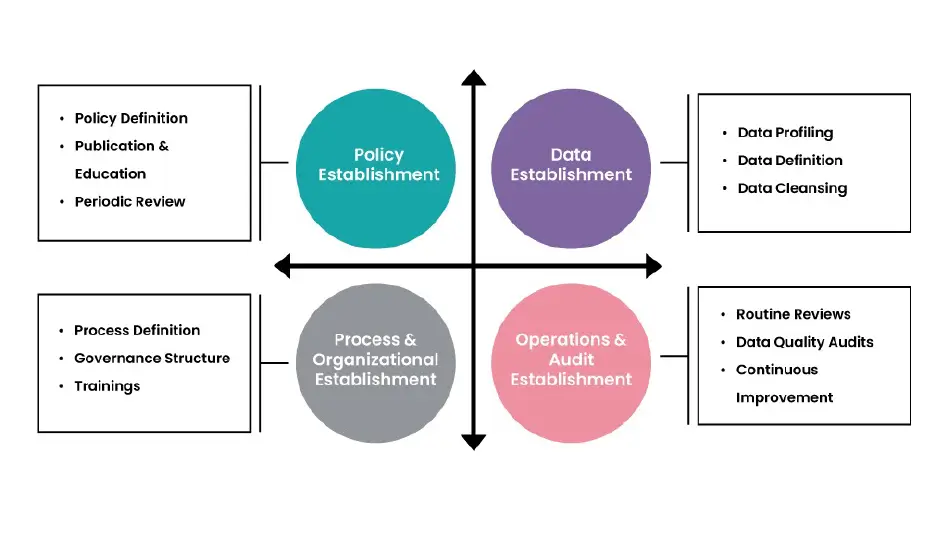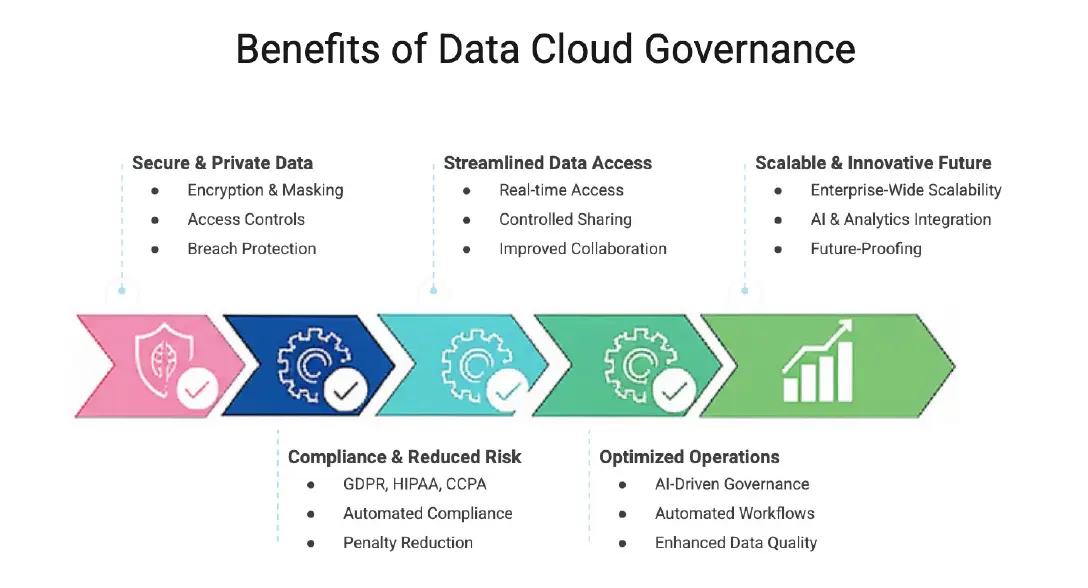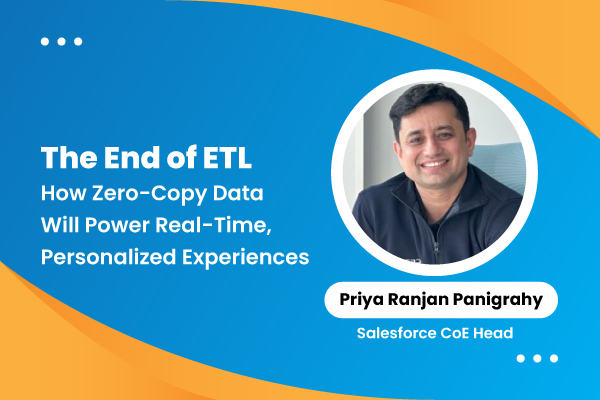In today’s rapidly evolving digital landscape, organizations generate and process vast amounts of structured and unstructured data. Ensuring data security, compliance, and accessibility at scale is a critical challenge. Data Cloud Governance addresses this need by providing a structured framework to manage, protect, and enforce policies on data within the Salesforce ecosystem.
This blog explores the key aspects of Data Cloud Governance, its role in modern data management, practical use cases demonstrating its impact on business operations, and how it works
Understanding Data Cloud Governance
Data Cloud Governance is a comprehensive framework that enables organizations to govern their data securely across multiple touchpoints, ensuring compliance with regulatory requirements while maximizing data utility. It integrates structured and unstructured data from diverse sources, enforces governance policies, and maintains security through encryption, access control mechanisms, and zero-copy data sharing strategies.
AI-Led Data Governance, Data Lineage, and Data Cataloging: The Foundation for AI-Ready Enterprises

In an era driven by AI and automation, enterprises must ensure their data is well-governed, structured, and AI-ready. AI-led data governance enhances compliance, data trust, and accelerates AI-driven business outcomes by automating policy enforcement, improving data profiling and cleansing, enabling real-time data lineage tracking, and ensuring proactive risk and compliance management. With AI-powered governance, organizations can establish a strong foundation for data security, operational efficiency, and scalable AI adoption.
Tracing the Path: Data Lineage and Its Impact on Data Governance
Effective data governance requires a clear understanding of how data flows across an organization. Data lineage plays a crucial role in this process by tracking the origin, movement, transformations, and destinations of data. This visibility enhances data transparency, quality assurance, regulatory compliance, and security by enabling organizations to monitor changes, detect anomalies, and assess the impact of modifications across data pipelines. By integrating data lineage with governance policies, businesses can ensure data integrity, improve auditing capabilities, and enhance decision-making based on accurate, traceable insights.
Enhancing Data Governance with Data Catalogs
A data catalog plays a pivotal role in strengthening data governance by offering a unified, searchable inventory of an organization’s data assets. By consolidating metadata, classifications, and access controls, it enhances data discoverability, security, and compliance while enabling collaboration across teams. A well-structured data catalog ensures that data users can efficiently locate, understand, and leverage high-quality data, supporting regulatory requirements and informed decision-making. Its integration with governance policies allows for seamless data lifecycle management, reducing inconsistencies and improving overall data trust.
How It Works
Data Cloud Governance operates through a structured process designed to ensure data security, compliance, and optimized usability:
- Tag & Classify: AI-driven data tagging and classification automate the organization of structured and unstructured data, ensuring governance policies align with industry regulations. This enhances compliance while improving data accessibility.
- Implement Policies at Scale: Governance policies are enforced dynamically across billions of records and complex data structures, ensuring role-based access control, attribute-based data masking, and compliance enforcement across business functions.
- Monitor & Secure Data Access: Real-time audits and compliance monitoring track data access, ensuring security and regulatory adherence. Role-based access controls and encryption strategies protect data integrity and mitigate unauthorized access risks.
- Enable Platform Convergence & Zero-Copy Sharing: Governance policies extend across hybrid environments through seamless integrations with AWS, Snowflake, and Azure. Zero-copy data sharing strategies ensure security and efficiency by preventing redundant data replication.
Key Components of Data Cloud Governance
- Policy-Based Governance
- Enforce access control, dynamic masking, and data purpose policies.
- Ensure only authorized users and AI agents can access sensitive data.
- AI-Driven Tagging & Classification
- Automate data classification to simplify compliance and enhance governance.
- Apply standardized labels such as HIPAA, GDPR, or PII.
- Data Space Management
- Segregate data by business unit, region, or brand for streamlined governance.
- Ensure distinct yet unified data management across an enterprise.
- Platform Encryption for Data Cloud
- Utilize Customer Managed Keys for secure data encryption at rest.
- Enhance data privacy and meet compliance standards.
- Metadata Exchange & Private Connect
- Enable secure, zero-copy integrations with external data sources (e.g., AWS, Snowflake, Azure).
- Ensure seamless, compliant data sharing without replication risks.
Key Use Cases of Data Cloud Governance
- Data Security & Access Management
A multinational financial services company needs to ensure that only authorized personnel can access customer financial records. Data Cloud Governance enables the adoption of Attribute-Based Access Control (ABAC) to restrict access based on user roles and permissions, ensuring compliance with industry regulations. - Dynamic Data Masking for Compliance
A healthcare provider handles sensitive patient records and must comply with HIPAA regulations. Dynamic Data Masking automatically hides personally identifiable information (PII) when accessed by unauthorized users while allowing relevant personnel to view necessary details. - Automated Data Classification for Regulatory Compliance
An e-commerce company operating in multiple regions must comply with GDPR and CCPA. Using AI-powered data classification, they tag and categorize data according to privacy regulations, ensuring seamless compliance and reducing legal risks. - Zero-Copy Data Integration for Analytics & AI
A global retail chain needs to integrate real-time customer insights without duplicating data. Private Connect for Data Cloud enables direct, zero-copy data sharing between Salesforce Data Cloud and external analytics platforms like Snowflake and Amazon Redshift, ensuring high-speed, secure data processing. - Multi-Business Unit Data Governance
A multinational corporation with multiple brands wants to manage data separately while maintaining a unified governance structure. Data Spaces allow them to segregate data by business units while ensuring a common governance policy framework across all brands.
Looking for a robust Data Cloud Governance solution? Saksoft offers secure, scalable, and compliant governance frameworks tailored to your business needs.
Final Thoughts
Data Cloud Governance is a game-changer for organizations looking to manage, secure, and optimize their data strategy effectively. By integrating data lineage, businesses can ensure data accuracy, traceability, and regulatory compliance while reducing operational risks. Additionally, a data catalog strengthens governance by providing a structured inventory of data assets, improving accessibility and collaboration across teams.
By implementing policy-based governance, AI-powered classification, encryption, private data connectivity, and zero-copy data sharing, businesses can enhance compliance, protect data integrity, and unlock the full potential of their data assets.
Looking for expert guidance in implementing Data Cloud Governance? Saksoft, a leading Salesforce partner, provides tailored governance solutions to ensure security, compliance, and scalability. Contact us today to explore how we can transform your data strategy.






